Can we actually change our moral responses? Much debate about moral issues is fruitless because, however well-justified the reasons given for one position or another, they make no difference to our position. Rather than changing our position in response to strong evidence or argument seen overall, we tend to focus on minor weaknesses in views we intuitively oppose (or minor strengths in views we support) and blow them out of proportion. I’ve recently been reading Jonathan Haidt, who encapsulates this situation in the image of the rider and the elephant.  The rider thinks he’s in charge, but most of the time he’s just pretending to direct an elephant that is going where it wants to go. He gives lots of psychological evidence for the extent to which we rationalise things we’ve already judged, rather than making decisions on the basis of reasoning. This is the whole field of cognitive bias. For example, people experiencing a bad smell are more likely to make negative judgements, and judges grant fewer parole applications when they’re tired in the afternoon than they do when they’re fresh in the morning.
The rider thinks he’s in charge, but most of the time he’s just pretending to direct an elephant that is going where it wants to go. He gives lots of psychological evidence for the extent to which we rationalise things we’ve already judged, rather than making decisions on the basis of reasoning. This is the whole field of cognitive bias. For example, people experiencing a bad smell are more likely to make negative judgements, and judges grant fewer parole applications when they’re tired in the afternoon than they do when they’re fresh in the morning.
However, too many people draw a cheap moral determinism out of this. That’s a determinism expressed by Hume in his famous line “reason is, and ought only to be, the slave of the passions, and can never pretend to any other office than to serve and obey them.” Fortunately Haidt, who’s a professor of moral psychology at the University of Virginia, recognises that Hume’s position is over-stated, and that it is based on a simplistic false dichotomy between reason and emotion. Just because the rider tends to over-estimate his influence on the elephant, doesn’t mean he has no influence at all. Rather, someone controlling a beast with as much bulk and momentum as an elephant needs to develop skills to encourage it in one direction rather than another, and to set up the conditions that will encourage it to go one way rather than another rather than just telling it and expecting it to obey instantaneously. Nor are the rider and the elephant to be equated to “reason” and “emotion”: each uses reasoning, and each has motives and starting points for reasoning, making a complex mixture of the two in both rider and elephant. The elephant would be better described as an elephant of intuition and the rider as conscious awareness.
Haidt, like most scientific or academic commentators on this kind of issue, also makes certain questionable assumptions. One of these is that of the essential unity of the rider and of the elephant (particularly the elephant). If it was true that the elephant definitely wanted to do one thing, and the rider another, it would be pretty much impossible to steer the elephant in any sense. But this is an over-simplification of the physical intuitions we get from our bodies. We may intuitively judge one way, but there is also an intuitive sympathy to some extent for the opposing approach. Perhaps we should not think of the rider so much as astride one elephant, as leading a herd of them. To lead the herd you find the elephant who is pre-disposed to act in the most objective way, encourage it, and (because elephants are herd animals) the rest are likely to follow.
That’s where integrative practice comes in. In the over-specialised world of academia, it seems to often to be the case that those engaged in crucial and ground-breaking research in psychology (such as, say, Daniel Kahneman and Jonathan Haidt) have evidently never experienced meditation, and completely ignore the potential of meditation and of other integrative practices to modify our responses. There are, of course, other academics investigating meditation, but these usually show little interest in ethics or judgement. Cheap determinism seems to rule, for the most part, because over-specialised people don’t join up the evidence in different quarters, and the incentive system could hardly be better geared to discourage synthetic thinking.
In meditation, one can become more aware of that variety of possible responses. Meditation is, in effect, a close scrutiny of the elephant on the part of the rider, from a sympathetic inside viewpoint. The better he knows the elephant, the more he can skilfully manage it. He can rein in the elephant a little so it has more time to listen to the other members of the herd. He can make it more aware of ambiguity using humour, art or poetry. He can give the elephant a wider range of options by educating its sensibility. He can help the elephant become more aware of the rider, and cultivate its sympathy for the rider.
That doesn’t mean that the elephant will ever cease to go where it wants to go. The question is just what it means to ‘want’. Wanting is never simple. We have lots of wants, and it is the integration of those wants that helps us steer the elephant in a more acceptable direction – indeed that helps us see what that better direction is. The rider really needs the elephant, and no merely abstract morality can be justified that does not take that elephant into account.
Picture: Rider and elephant by Dennis Jarvis (Wikimedia Commons)
